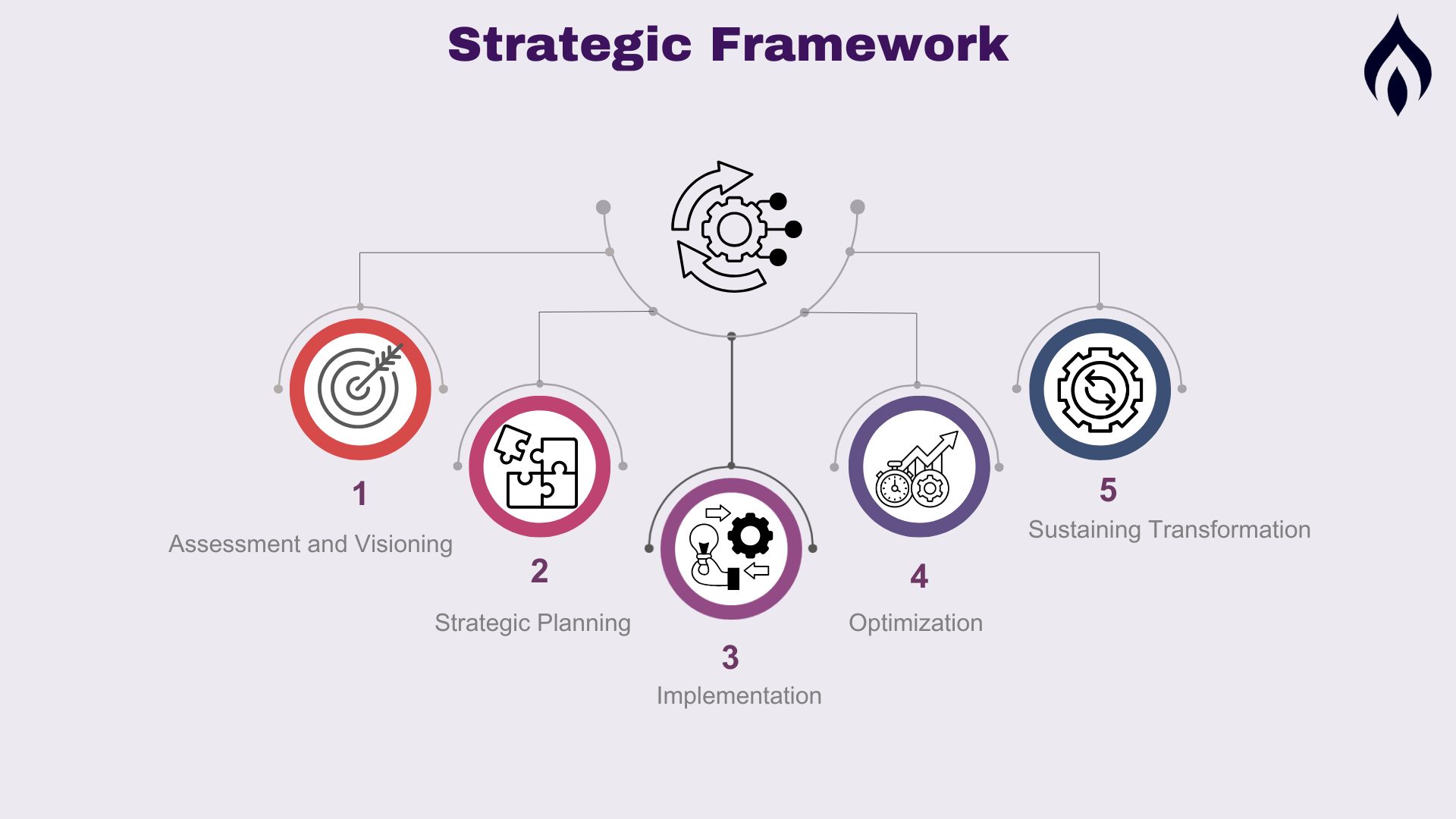
Digital Transformation Consulting: Defining the future of business
Digital Transformation Consulting: Defining the future of business
In the current business landscape, digital transformation has surfaced as a critical strategy for businesses focusing on maintaining cut-throat competition and fostering innovation. Digital transformation consulting is a guiding light, enabling companies in integrating advanced technologies seamlessly into their operations, hence redefining the operational efficiency and value delivery. This feature dives deep into the complicated realm of digital transformation consulting, its importance, the strategically defined frameworks, role of emerging technologies like Artificial Intelligence (AI), Internet of Things (IOT) and guidelines for successful implementation
What is Digital Transformation Consulting?
Digital Transformation Consulting confines a series of services that are designed to help businesses in integrating digital technologies across all operations. With digital integration companies make basic changes in how they operate and how they deliver value to their customers. Transformation consultants provide their expertise in developing strategies, implementing them with technology integration and assist in managing organizational changes to steer the complexities of digital evolution.
The need for Digital Transformation:
The continuous advancement of technology has caused a standard shift in consumer expectations and market mechanisms. Companies are coercing into adopting digital transformation to streamline their operations, enhance customer experience and cultivate innovation. A Strategically executed digital transformation plan helps companies to respond actively to market fluxes, optimize their operational costs, and open new revenue streams.
Strategic Frameworks in Digital Transformation:
A planned well-structured procedure is foremost for the successful implementation of digital transformation initiatives. Frameworks act as a blueprint which guides organizations through the transformation process. One of the frameworks is the five-stage digital strategy model, this includes:
- Assessment and Visioning: As the first stage it helps in defining clear vision that aligns with business mission by evaluating present digital capabilities.
- Strategic Planning: After defining a clear vision, the next stage involves developing a comprehensive roadmap that outlines all digital initiatives, resources required and timeline for execution.
- Implementation: Executing digital initiatives, securing link integration with existing systems and making effective changes.
- Optimization: Like all models’ optimization is the most important stage, it involves continuous monitoring of performance, gathering feedback and redefining certain digital processes to improve efficiency.
- Sustaining Transformation: Immersing a culture of continual innovation and flexibility to adapt to changing technology landscape is the final step of five stage digital strategy model
This five-stage digital strategy framework helps in making informed decisions, prioritize investments, and aids in effective management of complete transformation journey.
Emerging Technologies like IoT and AI, and their roles in digital transformation:
Internet of Things (IoT) and Artificial Intelligence (AI) are certain emerging technologies that are at the forefront of digital transformation, they offer transformative potential across all industries.
- Internet of Things (IoT): IoT refers to interconnection of sensor embedded physical devices with software that collects and exchange data. This connectivity allows real-time monitoring, predictive maintenance, and enhance operational efficiency. IoT consulting services assist companies or businesses in capitalizing on emerging technologies by devising holistic business models that bridge technology, vendors and customers together.
- Artificial intelligence (AI): AI confines machine learning, Natural language processing (NLP), and data analytics to spur human intelligence. AI driven solutions ease in automating processes, it provides predictive insights and enhances customer experience by personalization. Consultants that deal with digital transformation help companies in developing AI strategies that go hand in hand with businesses’ core objectives, they asses digital capabilities, and even ensure integration of AI in business processes.
A Digital Transformation Roadmap
A well-defined roadmap is the key for navigating companies through complexities of digital transformation. The key steps include:
- Defining Objective: Clearly defining transformation goals like improved customer engagement, improved operational efficiency, or innovation capabilities is the foremost and important step in the roadmap.
- Stakeholder Engagement: To ensure process alignment and collective ownership involvement of key stakeholders across departments is essential.
- Technology Selection: Identifying and selecting technologies that align with company’s current infrastructure and set objectives is the third step of roadmap.
- Change Management: In the whole transformation process it is important to consider the human aspect. Implementing strategies to manage the human aspect, that includes communication, training, and addressing any resistance to change.
- Performance Metrics: Setting up key performance indicators (KPIs) that monitor progress and measure the success of digital initiatives.
The above roadmap serves as a strategically structured guide, ensuring cohesive digital transformation efforts, goal orientation and adaptability towards emerging challenges in the technology landscape.
Challenges in Digital Transformation:
- Cultural Resistance: Due to uncertainty or disruptions in the existing routine, employees may resist the changes by digital transformation.
- Legacy Systems: Outdated technologies may prevent or delay the integration of the latest digital solutions in the processes.
- Resource Constraints: Budget and expertise can hinder the scope and pace of transformation initiatives.
- Data Security Concerns: Data breaching and other vulnerabilities can pop up if implementation of new technologies is not managed properly.
These challenges can be addressed by a strategic approach, effective communication and a commitment to continuous adaptation and learning.
Role of Digital Transformation Consulting Firms:
Transformation consulting firms play a vital role in navigating through complexities of digital initiatives. They provide their expertise in developing strategies, implementation of technology, and change management. Such firms provide comprehensive services that encompasses:
- Strategic Planning: Consultants assist businesses in developing digital strategies that align with their objectives.
- Technology Integration: Integration and implementation of technologies like IoT and AI that improve operational efficiency of organizations.
- Change Management: Smoothing cultural shifts in the organization to embrace digital transformation with open arms.
They leverage their industry expertise to derive solutions that address certain specific business challenges and capture opportunities.

Add a review
Your email address will not be published. Required fields are marked *